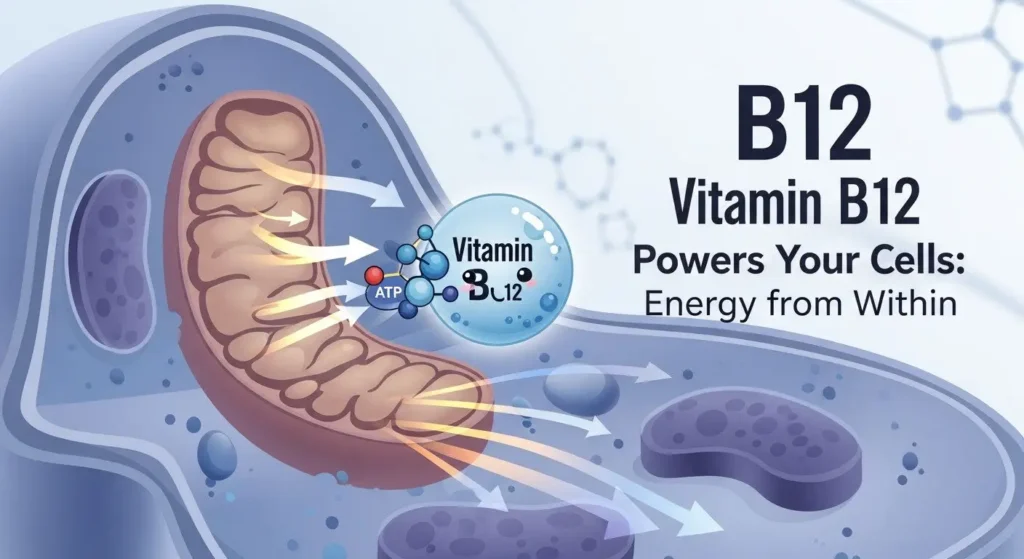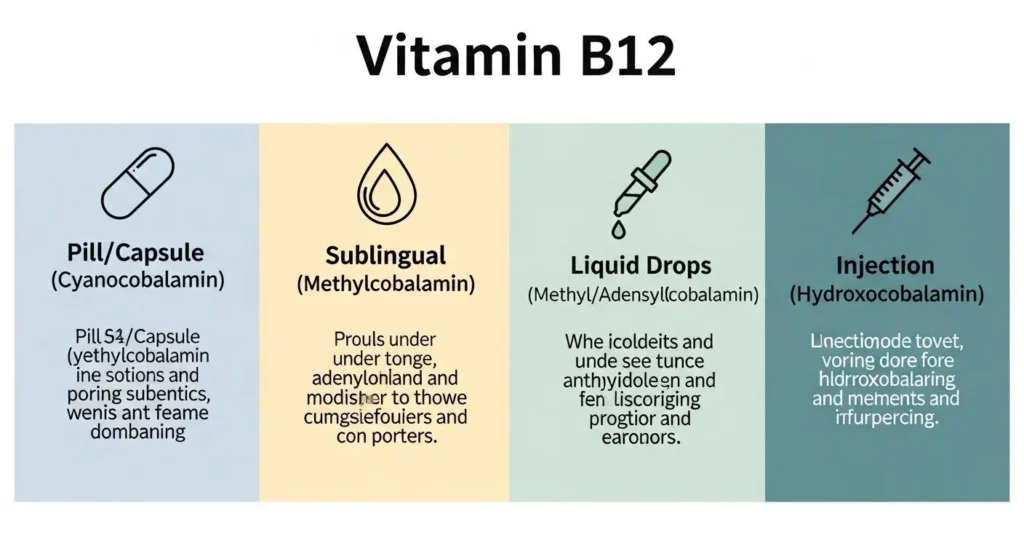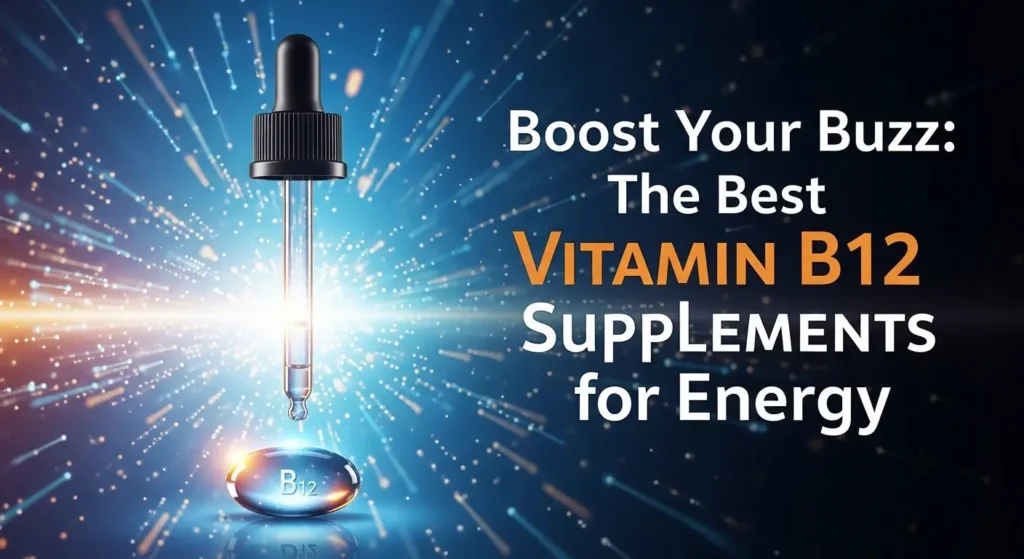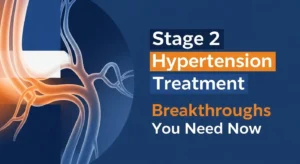Feeling tired, sluggish, or just not quite yourself? Many people chalk it up to a busy life, but sometimes, the answer lies in a simple nutrient: Vitamin B12 Supplements. This mighty vitamin is a true powerhouse for your body, playing a key role in everything from making red blood cells to keeping your brain sharp. And when it comes to energy, B12 is a superstar!
In this guide, we’ll dive deep into why Vitamin B12 is so important, how it helps with energy, and most importantly, how to choose the best vitamin B12 supplements to get your spark back. We’ll explore different types, what to look for, and answer common questions to help you make an informed choice. Get ready to learn how to feel more vibrant and energetic!
Key Takeaways
- Vitamin B12 is Essential for Energy: It helps your body turn food into energy and is crucial for making red blood cells, which carry oxygen.
- Common Deficiency Signs: Feeling tired, weak, having trouble concentrating, or experiencing numbness can be signs you need more B12.
- Various Supplement Forms: Vitamin B12 supplements come in pills, liquids, sublingual (under the tongue) forms, and even injections, each with different absorption rates.
- Methylcobalamin & Adenosylcobalamin Are Top Forms: These are “active” forms of B12 that your body can use right away, often better than cyanocobalamin.
- Consult Your Doctor: Always talk to a healthcare professional before starting any new supplement, especially if you have underlying health conditions.
What is Vitamin B12 and Why Is It So Important?
Vitamin B12, also known as cobalamin, is a vital nutrient that your body needs to function properly. Unlike some other vitamins, B12 is a water-soluble vitamin, which means your body doesn't store huge amounts of it and you need to get it regularly from your diet or supplements.

Think of B12 as a tiny, hard-working helper in your body. It's involved in some really big jobs:
- Energy Production: This is where B12 shines for energy! It helps your body convert the food you eat (carbohydrates, fats, and proteins) into glucose, which is your body's main source of fuel. Without enough B12, this process slows down, leaving you feeling drained.
- Red Blood Cell Formation: B12 is crucial for making healthy red blood cells. These cells are like tiny delivery trucks that carry oxygen from your lungs to every part of your body. If you don't have enough B12, your body can't make enough healthy red blood cells, leading to a condition called anemia, which causes extreme tiredness.
- Nerve Function: B12 helps keep your nervous system healthy. It plays a role in creating myelin, a protective sheath around your nerves. Healthy nerves mean better communication throughout your body, which can affect everything from your mood to your memory.
- DNA Synthesis: B12 is essential for making DNA, the genetic material in all your cells. This means it's involved in cell growth and repair throughout your body.
When your body doesn't get enough B12, these important jobs can't be done effectively, and that's when you start to notice symptoms like fatigue, weakness, and a general lack of energy.
Who Needs Vitamin B12 Supplements Most?
While anyone can experience low B12 levels, some groups are more prone to deficiency and could greatly benefit from vitamin B12 supplements.

Here's a look at who might need an extra boost:
- Vegans and Vegetarians: Vitamin B12 is naturally found mostly in animal products like meat, fish, eggs, and dairy. If your diet excludes these foods, it's very difficult to get enough B12 without supplements or fortified foods.
- Older Adults: As we age, our bodies become less efficient at absorbing vitamin B12 from food. This is often due to a decrease in stomach acid, which is needed to release B12 from food proteins, and a reduction in “intrinsic factor,” a protein necessary for B12 absorption.
- People with Digestive Issues: Conditions like Crohn's disease, celiac disease, or atrophic gastritis (thinning of the stomach lining) can impair B12 absorption.
- Those Who've Had Weight Loss Surgery: Gastric bypass or other weight loss surgeries can change the digestive tract, making it harder to absorb B12.
- People Taking Certain Medications: Some medications, such as proton pump inhibitors (for acid reflux) and metformin (for diabetes), can interfere with B12 absorption.
- Individuals with Pernicious Anemia: This is an autoimmune condition where the body attacks the intrinsic factor, making B12 absorption almost impossible without injections or very high-dose oral supplements.
- Heavy Drinkers: Alcohol can damage the digestive tract and hinder nutrient absorption, including B12.
If you fall into any of these groups or are experiencing persistent fatigue, it's a good idea to talk to your doctor about checking your B12 levels.
The Different Forms of Vitamin B12 Supplements
When you start looking for vitamin B12 supplements, you'll quickly notice there isn't just one kind. B12 comes in several forms, and understanding the differences can help you choose the best one for your needs.
Here are the main types:
- Cyanocobalamin:
- This is the most common and often the cheapest form of B12 found in supplements.
- It's a synthetic form that contains a cyanide molecule. Don't worry, the amount of cyanide is tiny and generally considered safe.
- Your body needs to convert cyanocobalamin into its active forms (methylcobalamin and adenosylcobalamin) before it can use it. This conversion process isn't always efficient for everyone.
- Pros: Stable, widely available, affordable.
- Cons: Requires conversion, may not be ideal for those with absorption issues or certain genetic variations.
- Methylcobalamin:
- This is one of the two “active” or “coenzyme” forms of B12, meaning your body can use it directly without conversion.
- It plays a key role in methylation, a process important for nerve health, detoxification, and DNA synthesis.
- Many people find methylcobalamin to be more effective, especially for neurological benefits and those with absorption challenges.
- Pros: Bioavailable (easily used by the body), active form, good for nerve health.
- Cons: Can be slightly more expensive than cyanocobalamin.
- Adenosylcobalamin:
- This is the other active coenzyme form of B12.
- It's crucial for energy production within the mitochondria (the powerhouses of your cells).
- Often, it's combined with methylcobalamin in supplements to provide a broader range of benefits, especially for cellular energy.
- Pros: Active form, directly supports cellular energy production.
- Cons: Less commonly found alone, usually combined.
- Hydroxocobalamin:
- This is a natural form of B12 produced by bacteria and found in some foods.
- It's often used in B12 injections in Europe and for treating cyanide poisoning.
- Your body can convert hydroxocobalamin into methylcobalamin and adenosylcobalamin.
- Pros: Good for sustained release, can be converted to active forms.
- Cons: Less common in oral supplements in the US.

Which form is best for energy?
For a direct energy boost and better absorption, methylcobalamin and adenosylcobalamin are often preferred because they are the active forms your body can use immediately. Some supplements combine both for comprehensive support.
How to Choose the Best Vitamin B12 Supplements
With so many options, picking the right B12 supplement can feel a bit overwhelming. Here's a guide to help you make an informed decision:
1. Consider the Form of B12
As discussed, methylcobalamin and adenosylcobalamin are generally considered superior for direct use by the body and for those with absorption issues. Cyanocobalamin is a good, stable option for many, but if you're looking for maximum impact or have specific concerns, the active forms are often recommended.
2. Choose Your Delivery Method
B12 supplements come in various ways to get into your body:
- Oral Pills/Capsules: These are the most common and convenient. They work well for most people who don't have severe absorption problems. Look for enteric-coated capsules if you have a sensitive stomach.
- Sublingual Tablets/Drops: These dissolve under your tongue, allowing B12 to be absorbed directly into your bloodstream, bypassing the digestive system. This is a great option for those with absorption issues or who prefer not to swallow pills.
- Liquid Drops: Similar to sublingual tablets, liquid drops are placed under the tongue or swallowed. They offer flexible dosing and are easy for those who have difficulty swallowing pills.
- B12 Injections: Administered by a healthcare professional, injections are the most direct and effective way to deliver B12, especially for severe deficiencies or conditions like pernicious anemia. This is usually reserved for diagnosed deficiencies.
- Nasal Sprays: A less common but effective option, especially for those who can't take oral supplements or injections.
3. Dosage and Potency
B12 dosages can range from a few micrograms (mcg) to several thousand. For general health and energy, typical dosages might be 500-1000 mcg. For deficiencies, your doctor might recommend much higher doses. It's important to:
- Start low and go slow: Especially if you're new to supplements.
- Follow doctor's advice: Always adhere to the dosage recommended by your healthcare provider.
- Look for quality: Higher potency doesn't always mean better absorption if the form isn't right for you.
4. Check for Quality and Purity
Not all supplements are created equal. Look for brands that:
- Are third-party tested: This means an independent lab has verified the product's contents and purity. Look for seals from organizations like NSF International, USP, or ConsumerLab.
- Are free from unnecessary fillers and allergens: If you have allergies, check for common culprits like gluten, soy, dairy, or artificial colors and flavors.
- Have good manufacturing practices (GMP) certification: This ensures the product is made under strict quality standards.
5. Consider Additional Ingredients
Some B12 supplements are combined with other B vitamins (like a B-complex) or other nutrients like folate, which works closely with B12. This can be beneficial for overall energy and health, but make sure you need the other ingredients too.
Top Picks: Best Vitamin B12 Supplements for Energy
Based on effectiveness, absorption, and user reviews, here are some of the best types of vitamin B12 supplements to consider for an energy boost.
1. Sublingual Methylcobalamin
- Why it's great: This form combines the highly bioavailable methylcobalamin with a sublingual delivery method, meaning it dissolves under your tongue. This bypasses the digestive system and allows for direct absorption into your bloodstream, making it incredibly effective for those with absorption issues or anyone seeking a quick and efficient boost.
- Ideal for: Vegans, older adults, those with digestive problems, or anyone wanting fast action.
- Look for: Products that clearly state “methylcobalamin” and “sublingual.”
2. Liquid B12 Drops (Methylcobalamin/Adenosylcobalamin Blend)
- Why it's great: Liquid drops offer flexible dosing and are easy to take, especially for those who dislike pills. A blend of methylcobalamin and adenosylcobalamin provides comprehensive B12 support, addressing both nerve health and cellular energy production. The liquid form also allows for quick absorption.
- Ideal for: Children, older adults, people with swallowing difficulties, or those looking for a customizable dose.
- Look for: Brands that offer a clear dropper for accurate dosing and state both active forms of B12.
3. High-Potency B12 Capsules (Methylcobalamin)
- Why it's great: For those who prefer the convenience of a capsule and don't have severe absorption issues, a high-potency methylcobalamin capsule can be very effective. It provides a steady supply of the active form of B12.
- Ideal for: General B12 maintenance, busy individuals, or those who prefer a traditional pill form.
- Look for: Capsules with 1000-5000 mcg of methylcobalamin, especially if you're addressing a known deficiency.
4. B12 Injections (Hydroxocobalamin or Methylcobalamin)
- Why it's great: If you have a severe deficiency, pernicious anemia, or significant malabsorption, injections are often the most effective solution. They deliver B12 directly into the muscle, ensuring 100% absorption. These are prescribed and administered by a healthcare professional.
- Ideal for: Diagnosed deficiencies, severe malabsorption, or those who don't respond to oral supplements.
- Look for: This option requires a doctor's prescription and administration.
A Note on Prostate Health
While we're talking about overall health and energy, it's worth noting that maintaining good nutrition is foundational. For men, this also includes paying attention to specific areas like prostate health. If you're exploring general wellness, you might also be interested in learning about the most effective prostate supplements reviewed for 2025. Understanding these options can be a crucial part of a holistic health approach. For more detailed information on specific products, you can check out reviews like Prostavive: Tackling Prostate Problems Head-On or a general guide to prostate supplements: understanding and your choice. Another helpful resource is Prostavive: The Natural Solution for Prostate Health.
Understanding Vitamin B12 Supplements Dosage and Potential Side Effects
How Much B12 Do You Need?
The recommended daily allowance (RDA) for B12 is quite small:
- Adults: 2.4 micrograms (mcg) per day.
- Pregnant people: 2.6 mcg per day.
- Breastfeeding women: 2.8 mcg per day.
However, when it comes to supplements, dosages are often much higher (hundreds or even thousands of mcg). Why the big difference?
- Absorption Efficiency: Your body only absorbs a small percentage of the B12 you consume, especially from oral supplements. Higher doses help ensure enough B12 gets into your system.
- Addressing Deficiency: If you have a deficiency, your doctor will likely recommend a much higher dose to replenish your stores quickly.
- Safety: B12 is a water-soluble vitamin, so any excess is usually flushed out by your body through urine. This makes it very safe, even at high doses. There's no established “upper limit” for B12 because it's considered to have very low toxicity.
Are There Any Side Effects?
B12 is generally considered very safe, and side effects are rare, even at high doses. Most people experience no adverse effects. However, some individuals might notice:
- Mild stomach upset: Nausea or diarrhea, though uncommon.
- Headache: Rarely reported.
- Skin reactions: Itching, rash, or acne in very sensitive individuals.
- Allergic reactions: Extremely rare, but possible, especially with injections.
If you experience any unusual or severe symptoms after taking a B12 supplement, stop taking it and consult your doctor.
Maximizing Your B12 Absorption and Energy
Taking the right supplement is just one part of the equation. Here are some tips to help you get the most out of your vitamin B12 supplements and boost your energy levels:
- Take it consistently: Vitamin B12 supplements works best when taken regularly. Make it part of your daily routine.
- Consider taking with food: While vitamin B12 supplements can be taken on an empty stomach, taking it with a meal might help prevent any mild stomach upset.
- Pair with Folate (Vitamin B9): B12 and folate work hand-in-hand. A deficiency in one can impact the other. Many B-complex supplements include both.
- Address underlying issues: If your B12 deficiency is due to an underlying condition (like digestive problems or certain medications), simply taking a supplement might not be enough. Work with your doctor to address the root cause.
- Maintain a healthy lifestyle: No supplement is a magic bullet. Combine your B12 intake with a balanced diet, regular exercise, adequate sleep, and stress management for optimal energy and overall health. Speaking of overall health, if you're also focusing on weight management, you might be interested in Liv Pure Reviews: What to Expect When You Try It.
When to See a Doctor About Vitamin B12 Supplements
While vitamin B12 supplements are widely available and generally safe, it's always a good idea to consult a healthcare professional, especially if:
- You suspect a deficiency: If you're experiencing symptoms like persistent fatigue, weakness, numbness or tingling, memory problems, or mood changes.
- You're in a high-risk group: Vegans, older adults, or those with certain medical conditions or on specific medications should discuss B12 with their doctor.
- You're pregnant or breastfeeding: Your B12 needs change during these times, and a doctor can recommend the appropriate dosage.
- You're considering high doses: While B12 is safe, a doctor can help determine the right dose for your specific needs and monitor your progress.
- You have any existing health conditions: It's always wise to discuss new supplements with your doctor to ensure they don't interact with other medications or conditions.
A simple blood test can confirm your B12 levels and help your doctor recommend the best course of action.
Frequently Asked Questions About Vitamin B12 Supplements
Q1: How long does it take for B12 supplements to work for energy?
A1: It varies! Some people report feeling more energetic within a few days to a week, especially if they had a significant deficiency. For others, it might take several weeks to notice a big difference as your body replenishes its stores. Consistency is key.
Q2: Can I get too much B12 from supplements?
A2: B12 is a water-soluble vitamin, meaning your body excretes any excess through urine. There's no known “upper limit” for B12, and it's considered very safe, even at high doses. Serious side effects are extremely rare.
Q3: Are B12 injections better than oral supplements?
A3: For severe deficiencies or conditions like pernicious anemia where absorption is severely impaired, injections are often necessary and more effective because they bypass the digestive system entirely. For most people with mild to moderate deficiencies or for general maintenance, high-dose oral or sublingual supplements can be just as effective.
Q4: Should I take B12 every day?
A4: For general maintenance and to prevent deficiency, daily intake is usually recommended, especially for high-risk groups. If you have a severe deficiency, your doctor might recommend more frequent or higher doses initially.
Q5: Can B12 help with weight loss?
A5: B12 plays a role in metabolism and energy production, so if a deficiency is causing fatigue that limits your activity, correcting it might indirectly help with energy for exercise. However, B12 supplements are not a direct weight-loss solution. Weight loss is a complex process often requiring a combination of diet, exercise, and lifestyle changes.
Q6: What's the difference between methylcobalamin and cyanocobalamin?
A6: Methylcobalamin is an “active” form of B12 that your body can use directly. Cyanocobalamin is a synthetic form that your body needs to convert into methylcobalamin or adenosylcobalamin before it can be used. Many people prefer methylcobalamin for better absorption and effectiveness, especially if they have absorption issues.
Conclusion: Recharge Your Life with B12
If you're constantly battling fatigue and a lack of energy, exploring vitamin B12 supplements could be a game-changer. This vital nutrient plays a critical role in turning your food into fuel, making healthy red blood cells, and keeping your nervous system in top shape.
By understanding the different forms of B12, knowing which delivery method suits you best, and choosing high-quality products, you can effectively boost your B12 levels and reclaim your vitality. Remember to always consult with your doctor before starting any new supplement regimen to ensure it's the right choice for your individual health needs. Here's to a more energetic and vibrant you!
Find Your Ideal Vitamin B12 Supplement!
Answer a few questions to get personalized recommendations for the best B12 supplement for your needs.
Your personalized recommendations will appear here.







